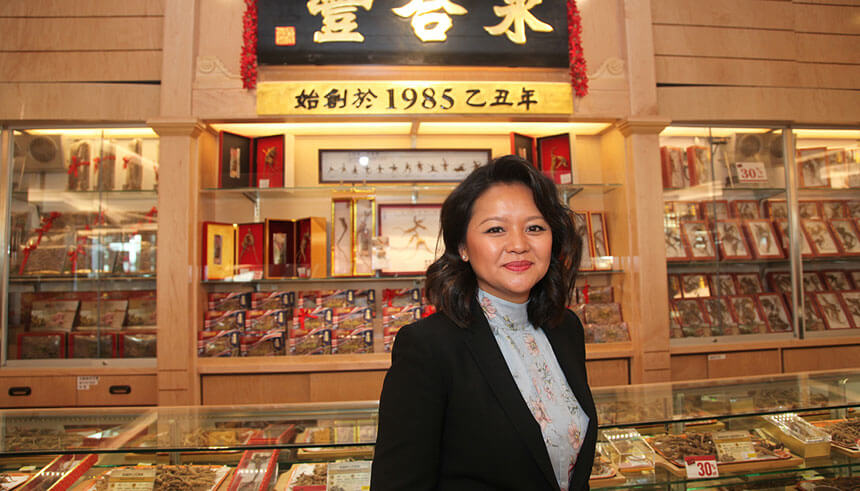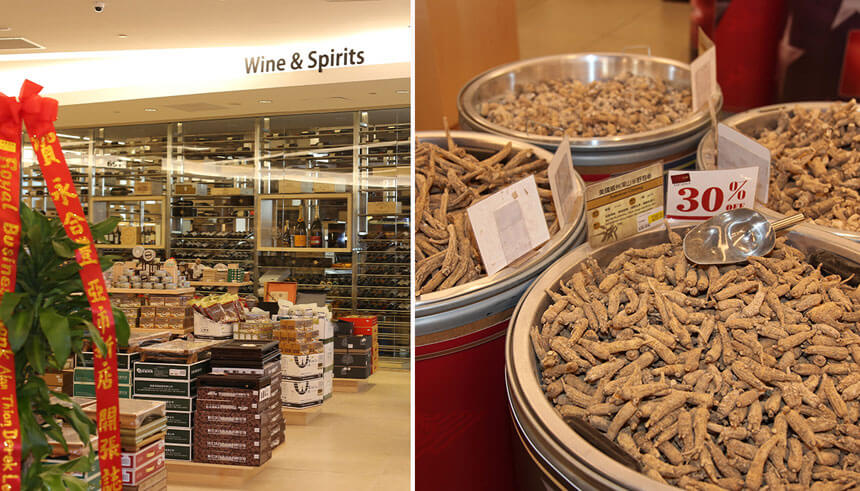Entrepreneur Insight
A New Generation Takes Traditional Herb Shop Wing Hop Fung to the Next Level
By Melody Yuan

How the SBA 504 loan helped the Ong family expand their herb and tea empire
Entering a Wing Hop Fung store is akin to walking into an apothecary full of herbs, spices and teas from around the world. From ginseng roots and dried mushrooms, to green teas and spirits, Wing Hop Fung is one of the biggest retailers of Asian herbs, teas and products in Southern California. Established in 1985, Wing Hop Fung translates to “Together, Forever, Prosper” in Cantonese. With humble beginnings as a family-owned business in downtown Los Angeles’ Chinatown district, Wing Hop Fung has since grown and modernized with the times under the direction of Lan Ong, the managing director and daughter of the founder.
“Our family came to the U.S. as refugees from Asia; we were part of the Vietnamese boat people who immigrated to escape communism,” says Ong. “And when my father first came here, he had the American dream just like everyone else.”
Dayton Ong arrived in the U.S. and began working as a dishwasher. It didn’t take long for him to realize that this wasn’t the life he had in mind, and he decided to open his own traditional herbal medicine store. “In fact, my grandfather, great-grandfather and great-great-grandfather were all doctors of traditional Chinese medicine,” says Ong. “So, my father decided that the only way he would earn a good living is to do what he knows how to do best: start the business and look for ways to import Chinese herbs and teas to sell to other immigrants who were looking for those products locally in Southern California.”

Because the Ong family were refugees without many assets, it was challenging to find resources and financial options to start the business. “My father was able to find a business partner, and through his credit history, we were able to qualify for a very small loan,” says Ong. “Our family really didn’t have many assets or collateral in the beginning for the bank.” The business today is fully owned and operated by the Ong family and has been expanding ever since.
Expanding with an SBA loan
While Wing Hop Fung began in downtown Los Angeles’ Chinatown district and thrived there from the 1980s to the early 2000s, the Ong family noticed that their consumer demographic was moving further east. In 2005, the business opened a store in Monterey Park, which has a population that is 67 percent Asian, 26 percent Hispanic or Latino and 4 percent Caucasian. With 76 percent of its entire population speaking a non-English language, it made sense for Wing Hop Fung to set up shop there. In 2015, the Ong family opened another store in the Westfield Santa Anita mall in Arcadia, a mall that has been tailored to a growing number of Asian retailers. “And now, with the help of East West Bank and the SBA loan, we’ve purchased our own plaza in El Monte and are able to move our entire warehouse and another retail unit in there,” says Ong. “We’ve transitioned from renting and being tenants to becoming actual owners and users of our facilities at Wing Hop Fung plaza.”
With the business now in full growth stage, the family decided to take out an SBA 504 loan from East West Bank to acquire real estate for a bigger warehouse and corporate offices.
Often used to purchase fixed assets such as real estate and equipment, the SBA 504 loan structure provides flexibility and support for a business that is looking to invest more money in its growth stage. According to the SBA site, 40 percent of a 504 loan is funded by the SBA, 50 percent by a participating lender, and 10 percent by the borrower in the form of a down payment.
“The big value propositions include the fact that the SBA program can finance up to 90 percent of the purchasing price, as opposed to, say, a commercial real estate loan program that can only finance up to 65 percent of the purchasing price for an owner-occupied building,” says Lydia Fong, first vice president and SBA senior regional sales manager at East West Bank in Southern California. “Not to mention, the SBA program has 25 years of full amortization, as opposed to commercial real estate’s 10-year repayment term,” she continues. “The SBA loan program’s amortization term is really in the borrower’s favor because it doesn’t require a loan renewal during those 25 years, which saves time, hassle and money.”
Ong agrees: “The SBA loan was amazing because we were able to get the financial capital we needed to expand our corporate warehouse. We were actually able to purchase the building with a smaller amount of down payment, so that we could allow our cash flow to be healthy and use that to further develop our branding.”
Adapting to the times as a cross-border business
The Ong family recently returned from a two-week trip around Asia to meet with the farmers, suppliers and distributors in their network. Given the origins of its business and its Chinese name, many may assume that Wing Hop Fung imports herbs and teas strictly from China. “But not all of our products come from China,” says Ong. “Some of our abalone and dried seafood come from places like South Africa, our specialty honeys are from New Zealand, and our Hokkaido scallops, sea cucumbers and some teas come from Japan.” The store is also expanding its wine and spirits selection, with many of their alcoholic imports coming from France. “We’ve definitely grown our retail offerings to provide what our clients want. And because we get our products directly from the source, we travel frequently to these locations to meet and greet our suppliers, and also conduct quality control testing,” says Ong.
As a cross-border business that imports regularly from around the world, especially China, Wing Hop Fung has felt the impact of the current U.S.-China trade war. “It’s something that we’re currently discussing with our suppliers to negotiate prices because of the higher tariffs,” Ong says. “The tariffs just happened so suddenly that we’re in the thick of learning how to deal with it. We don’t want a drastic price increase for our customers, so we’re negotiating with our vendors, suppliers and manufacturers to find an acceptable way to keep prices lower.”
[Also read: Now What? Strategies for Navigating US-China Tariffs for Businesses”]
With 20 percent of their business based in wholesale and most of their distribution network extending into other states, Wing Hop Fung’s business has scaled tremendously. “We serve a lot of other Asian retail customers, with markets in places like Seattle, Texas, Chicago and New York,” says Ong. “We also distribute for a number of other reputable Asian brands around the country.”
One of the challenges that Wing Hop Fung faces is modernizing and staying relevant to a younger audience. One trend the Ong family observed in younger consumers is the growing awareness and acceptance of wholesome, natural and less invasive lifestyles. “We have seen a shift in how people are taking care of themselves,” says Ong. “Herbal medicine has always been more of a preventative method of health care, as opposed to western pharmaceutical methods.” Growing consumer interest in natural products puts Wing Hop Fung at a unique advantage. “We’re finding that our clientele has expanded,” says Ong. “We’re not just focusing on the Asian clients anymore—we’ve definitely expanded our reach to serve all cultures across many generations.”
In addition to serving a new clientele, the Ong family has been investing in technology and e-commerce upgrades. “We’re investing a lot of our financial resources to growing our e-commerce,” says Ong. “We recently updated our website and saw our web traffic and business grow tenfold in the last three years, which is amazing.” The family plans to continue expanding its internet reach and increasing online sales.
Advice to other business owners
If you are a business owner looking to expand, or are exploring the option of an SBA 504 loan, Fong has a few recommendations. “First, have the buyer pre-qualify for a loan in advance so that they won’t waste time looking for properties outside of their affordable price range. Keep in mind that the buyer must occupy at least 51 percent of the building’s gross area in order to qualify,” she says. Fong strongly suggests having all business paperwork ready prior to applying for the loan. “Make sure you have the down payment documentation, and make sure you have that down payment money in your bank account for at least two months before applying for the loan,” she says. Proving to your lender that you are adept at managing money is important.
“The SBA program can finance up to 90 percent of the purchasing price, as opposed to, say, a commercial real estate loan program that can only finance up to 65 percent of the purchasing price for an owner-occupied building.”

Given the success of Wing Hop Fung as a burgeoning family business, Ong also offers advice beyond the SBA 504 loan to budding entrepreneurs.
- Research and understand your market
- Look for available resources to tap into
- Strive to build a great team
“I’ve been in the business since I was a little girl, and to be honest, I still don’t know everything there is to know about maintaining a business,” says Ong. “In any line of business, it’s important to not only be knowledgeable about the product, but understand who it is you’re trying to serve. Then you need to package it all with your business skills from the operational to the human resources side of things.”
Ong admits that maintaining a business is never easy and attributes her family business’s success to her team. “I feel like we’ve made it this far because most of our employees, from our floor managers to warehouse workers, have been with our family for many years,” says Ong. “I truly believe that this kind of loyalty is important, so take care of your employees. Building a team you can trust and empower is so important.”
Sign up for the Reach Further Newsletter
We’ll keep you in the know about the latest US-Asia business news and trends.
Suscríbase al boletín Reach Further
Lo mantendremos informado sobre las últimas noticias y tendencias comerciales entre Estados Unidos y China.

